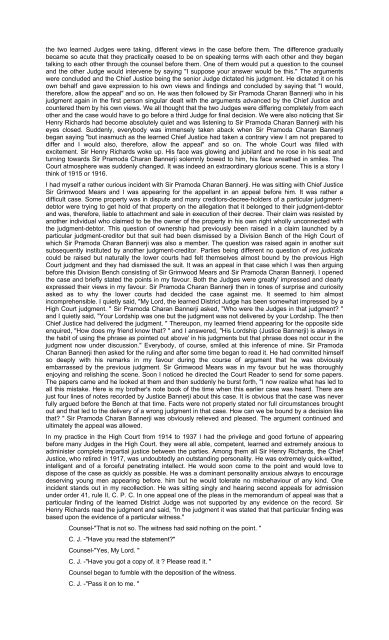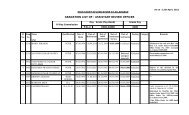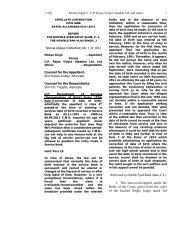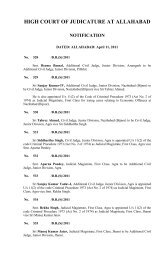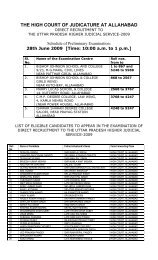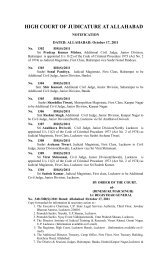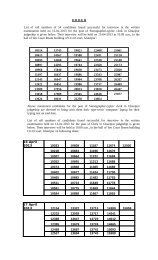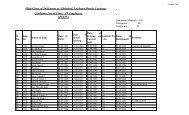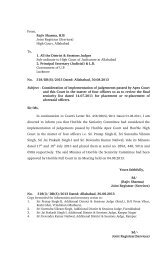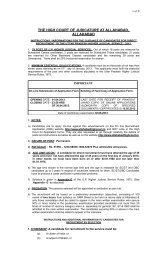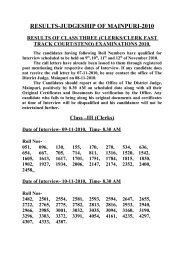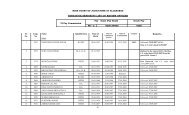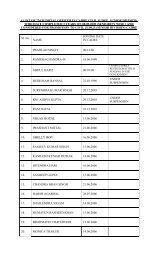the two learned <strong>Judges</strong> were taking, different views in the case before them. The difference graduallybecame so acute that they practically ceased to be on speaking terms with each other <strong>and</strong> they begantalking to each other through the counsel before them. One of them would put a question to the counsel<strong>and</strong> the other Judge would intervene by saying "I suppose your answer would be this." The argumentswere concluded <strong>and</strong> the Chief Justice being the senior Judge dictated his judgment. He dictated it on hisown behalf <strong>and</strong> gave expression to his own views <strong>and</strong> findings <strong>and</strong> concluded by saying that "I would,therefore, allow the appeal" <strong>and</strong> so on. He was then followed by Sir Pramoda Charan Bannerji who in hisjudgment again in the first person singular dealt with the arguments advanced by the Chief Justice <strong>and</strong>countered them by his own views. We all thought that the two <strong>Judges</strong> were differing completely from eachother <strong>and</strong> the case would have to go before a third Judge for final decision. We were also noticing that SirHenry Richards had become absolutely quiet <strong>and</strong> was listening to Sir Pramoda Charan Bannerji with hiseyes closed. Suddenly, everybody was immensely taken aback when Sir Pramoda Charan Bannerjibegan saying "but inasmuch as the learned Chief Justice had taken a contrary view I am not prepared todiffer <strong>and</strong> I would also, therefore, allow the appeal" <strong>and</strong> so on. The whole Court was filled withexcitement. Sir Henry Richards woke up. His face was glowing <strong>and</strong> jubilant <strong>and</strong> he rose in his seat <strong>and</strong>turning towards Sir Pramoda Charan Bannerji solemnly bowed to him, his face wreathed in smiles. TheCourt atmosphere was suddenly changed. It was indeed an extraordinary glorious scene. This is a story Ithink of 1915 or 1916.I had myself a rather curious incident with Sir Pramoda Charan Bannerji. He was sitting with Chief JusticeSir Grimwood Mears <strong>and</strong> I was appearing for the appellant in an appeal before him. It was rather adifficult case. <strong>Some</strong> property was in dispute <strong>and</strong> many creditors-decree-holders of a particular judgmentdebtorwere trying to get hold of that property on the allegation that it belonged to their judgment-debtor<strong>and</strong> was, therefore, liable to attachment <strong>and</strong> sale in execution of their decree. Their claim was resisted byanother individual who claimed to be the owner of the property in his own right wholly unconnected withthe judgment-debtor. This question of ownership had previously been raised in a claim launched by aparticular judgment-creditor but that suit had been dismissed by a Division Bench of the High Court ofwhich Sir Pramoda Charan Bannerji was also a member. The question was raised again in another suitsubsequently instituted by another judgment-creditor. Parties being different no question of res judicatacould be raised but naturally the lower courts had felt themselves almost bound by the previous HighCourt judgment <strong>and</strong> they had dismissed the suit. It was an appeal in that case which I was then arguingbefore this Division Bench consisting of Sir Grimwood Mears <strong>and</strong> Sir Pramoda Charan Bannerji. I openedthe case <strong>and</strong> briefly stated the points in my favour. Both the <strong>Judges</strong> were greatly' impressed <strong>and</strong> clearlyexpressed their views in my favour. Sir Pramoda Charan Bannerji then in tones of surprise <strong>and</strong> curiosityasked as to why the lower courts had decided the case against me. It seemed to him almostincomprehensible. I quietly said, "My Lord, the learned District Judge has been somewhat impressed by aHigh Court judgment. " Sir Pramoda Charan Bannerji asked, "Who were the <strong>Judges</strong> in that judgment? "<strong>and</strong> I quietly said, "Your Lordship was one but the judgment was not delivered by your Lordship. The thenChief Justice had delivered the judgment. " Thereupon, my learned friend appearing for the opposite sideenquired, "How does my friend know that? " <strong>and</strong> I answered, "His Lordship (Justice Bannerji) is always inthe habit of using the phrase as pointed out above' in his judgments but that phrase does not occur in thejudgment now under discussion." Everybody, of course, smiled at this inference of mine. Sir PramodaCharan Bannerji then asked for the ruling <strong>and</strong> after some time began to read it. He had committed himselfso deeply with his remarks in my favour during the course of argument that he was obviouslyembarrassed by the previous judgment. Sir Grimwood Mears was in my favour but he was thoroughlyenjoying <strong>and</strong> relishing the scene. Soon I noticed he directed the Court Reader to send for some papers.The papers came <strong>and</strong> he looked at them <strong>and</strong> then suddenly he burst forth, "I now realize what has led toall this mistake. Here is my brother's note book of the time when this earlier case was heard. There arejust four lines of notes recorded by Justice Bannerji about this case. It is obvious that the case was neverfully argued before the Bench at that time. Facts were not properly stated nor full circumstances broughtout <strong>and</strong> that led to the delivery of a wrong judgment in that case. How can we be bound by a decision likethat? " Sir Pramoda Charan Bannerji was obviously relieved <strong>and</strong> pleased. The argument continued <strong>and</strong>ultimately the appeal was allowed.In my practice in the High Court from 1914 to 1937 I had the privilege <strong>and</strong> good fortune of appearingbefore many <strong>Judges</strong> in the High Court. they were all able, competent, learned <strong>and</strong> extremely anxious toadminister complete impartial justice between the parties. Among them all Sir Henry Richards, the ChiefJustice, who retired in 1917, was undoubtedly an outst<strong>and</strong>ing personality. He was extremely quick-witted,intelligent <strong>and</strong> of a forceful penetrating intellect. He would soon come to the point <strong>and</strong> would love todispose of the case as quickly as possible. He was a dominant personality anxious always to encouragedeserving young men appearing before. him but he would tolerate no misbehaviour of any kind. Oneincident st<strong>and</strong>s out in my recollection. He was sitting singly <strong>and</strong> hearing second appeals for admissionunder order 41, rule II, C. P. C. In one appeal one of the pleas in the memor<strong>and</strong>um of appeal was that aparticular finding of the learned District Judge was not supported by any evidence on the record. SirHenry Richards read the judgment <strong>and</strong> said, "In the judgment it was stated that that particular finding wasbased upon the evidence of a particular witness."Counsel-"That is not so. The witness had said nothing on the point. "C. J. -"Have you read the statement?"Counsel-"Yes, My Lord. "C. J. -"Have you got a copy of. it ? Please read it. "Counsel began to fumble with the deposition of the witness.C. J. -"Pass it on to me. "
Counsel passed the statement on to the Bench. The Chief Justice read it. Unfortunately, it appeared thatthere was a line in that statement dealing with the matter before the District Judge. The Chief Justicebecame furious. I shall never forget the sight of his face which was red with anger <strong>and</strong> he burst forthwith,"Appeal dismissed with costs, " <strong>and</strong> added, "I shall never believe in future a word of what you say". It wassuch a passionate denunciation <strong>and</strong> the remark was uttered with such vehemence that Counsel probablythought his continuance in Allahabad was now an absolutely hopeless proposition <strong>and</strong> he left Allahabadfor good within a week <strong>and</strong> shifted himself to the Lahore High Court.I attracted the notice of Sir Henry Richards very early in a rather curious fashion. I was engaged as ajunior in a particular appeal for the appellant. There were several senior Advocates like Dr. Sapru, SirSunder Lal <strong>and</strong> Mr. O'Conor already appearing in the case. When the case was called on before theChief Justice unfortunately all the senior counsel were engaged in other Courts <strong>and</strong> in as much as myinstructions were definite that I was to assist my seniors but not to argue the case myself, I stood up <strong>and</strong>prayed for an adjournment. The Chief Justice looked at the youthful pleader before him <strong>and</strong> granted myprayer but with a smiling countenance he looked at me <strong>and</strong> said, "What are you here for? Why don't youargue the case? Are you here for ornament's sake? " I was greatly touched <strong>and</strong> told him that I was onlytoo ready to argue the case myself but my instructions were precisely to the contrary. I, thereafter, made ita rule of my life never to make a motion for adjournment of any case on the ground of the engagement ofmy seniors elsewhere.Service <strong>Judges</strong> were usually drawn from the Indian Civil Service (Judicial Branch) <strong>and</strong> as in those days50 years ago the Indian Civil Service was mostly manned by British people, our Service <strong>Judges</strong> weremostly all British people.In the first ten years of my practice in the Allahabad High Court, we had several Service <strong>Judges</strong> oflearning <strong>and</strong> judicial experience. <strong>Some</strong> of them I remember vividly-Sir William Tudball, Sir EdwardMaynard Des Chamier, Theodore Caro Piggott, Benjamin Lindsay, Sir Louis Stuart, James Allsop <strong>and</strong> SirEdward Bennet. Each one was anxious to do justice between the parties but as was to be expected frompeople who had devoted the whole of their lives to a judicial career, right from the start, all of them hadpersonalities <strong>and</strong> characteristics of their own <strong>and</strong> the access to their hearts, minds <strong>and</strong> brains was to befound in different ways. For instance, Mr. Justice Lindsay was a most careful, painstaking Judge. He wasanxious to become acquainted with all the papers on the record <strong>and</strong> with all the facts <strong>and</strong> circumstancesof the case in detail. He did not like to look into papers at home <strong>and</strong> endeavoured to master the casebefore him by studying in Court. He liked the pleadings, the evidence <strong>and</strong> the judgment to be laid beforehim in full so that nothing important might escape his notice. All this meant <strong>and</strong> involved a slow processbut it appealed to many members' of the Bar <strong>and</strong> a hearing before him was greatly longed for, welcomed<strong>and</strong> appreciated. Mr. Justice Louis Stuart was a perfect opposite of Mr. Justice Lindsay. He endeavoured<strong>and</strong> generally was able to read the important papers of the case at home <strong>and</strong> at the hearing in Court hewas brisk <strong>and</strong> keen to come to the point in a few minutes <strong>and</strong> to dispose of the case as quickly aspossible. In view of these differing temperaments, methods of approach before the two <strong>Judges</strong> werealmost diametrically opposed to each other <strong>and</strong> it was desirable for every advocate to adjust himself tothe mental processes of the two learned <strong>Judges</strong>.Once I had a very curious, rather amusing, experience before these two learned <strong>Judges</strong>. They weresitting jointly together on a Division Bench <strong>and</strong> I had to argue a second appeal before them for theappellant in the case. I opened the case <strong>and</strong> after shortly stating the facts began reading the plaint. As Iwas doing so Mr. Justice Stuart, who was fully aware of the facts of the case, suddenly put a question tome on the merits. I dropped the plaint <strong>and</strong> applying myself to Justice Stuart's question began answeringit. I noticed that Justice Lindsay was considerably irritated <strong>and</strong> he was much annoyed at the interruptioncaused by Justice Stuart's question. In a few minutes after completing my answer to Justice Stuart'squestion I came back to the plain <strong>and</strong> resumed its reading. I had not proceeded very far when JusticeStuart broke in again with another question <strong>and</strong> again I had to veer round <strong>and</strong> apply myself to answeringthat question. I noticed that Justice Lindsay's irritation became still more pronounced <strong>and</strong> he beganscratching his hair with his fingers. Again after finishing my answer to Justice Stuart I came back to theplaint once again. Shortly, afterwards, came another interruption. This time Justice Lindsay could notcontrol himself <strong>and</strong>, believe it or not, he stretched his left h<strong>and</strong> (Justice Stuart was sitting on his left) <strong>and</strong>placing it almost within an inch in front of Stuart's mouth tried to choke Justice Stuart off <strong>and</strong> turning tome observed, "You better continue your argument. " The scene was an extraordinarily facetious one.Every body in court laughed including the two <strong>Judges</strong> but Justice Lindsay gained his object <strong>and</strong> JusticeStuart kept quiet all through the hearing <strong>and</strong> never interrupted again to oppose any other question.Justice Stuart's manner was held by many advocates, seniors <strong>and</strong> juniors alike, to be much too abrupt<strong>and</strong> indicative of impatience. The Judge was obviously anxious to shorten the hearing of the case asmuch as possible <strong>and</strong> to dispose it of in a few minutes.Sir Edward Bennet was equally impatient <strong>and</strong> equally non appreciative of long arguments. He wanted tostudy the case all by himself <strong>and</strong> so just as the case was briefly opened before him he would invariablystart with a series of questions, "How many witnesses were there, Dr. Katju? " I would give the number<strong>and</strong> the names. "Where is the evidence of so <strong>and</strong> so? " I would give the page. He would read for himself<strong>and</strong> then ask about the next witness. The process went on till he concluded his reading of the evidence<strong>and</strong> the relevant papers all by himself <strong>and</strong> then asked me for the main points of my arguments. I wouldput them before him <strong>and</strong> try to meet the opposite side's version of the case <strong>and</strong> then after a shortargument from my learned friend on the other side the hearing of the case would come to an end.I need not say that much depends in Court on the temperament of the Advocate also. If he is a laborious,long-winded gentleman, anxious to go into details of the case, he finds the atmosphere before <strong>Judges</strong> likeJustices Stuart <strong>and</strong> Bennet rather uncongenial, but advocates who are themselves not given to elaboratepreparations of their briefs <strong>and</strong> are anxious to put their cases as shortly <strong>and</strong> precisely as possible, get


